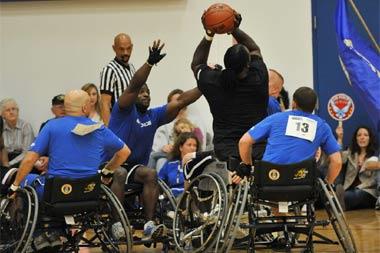Some of the country's leading veterans service organizations have rejected changes proposed by the Department of Veterans Affairs that might create disparities between veterans filing for a disability on paper and those filing electronically.
Additionally, some say the new changes are only to slow the VA's receipt of new claims while it tries to eliminate its backlog by 2015. The VA published the proposed changes to the Federal Register on Oct. 31.
"VA wants to make it as fast and easy as possible for veterans and their survivors to file for and receive an accurate decision on their claim," the department told Military.com in a statement. "This proposed rule would require the use of standardized forms to help streamline the claims process and modernize the VA system to ensure veterans and their families receive the benefits they deserve more quickly."
But that's now how the Veterans of Foreign Wars, The American Legion, and other groups see it. In official comments to the VA, the groups said the changes would penalize veterans who do not have access to a computer or the internet by relegating paper-initiated claims to a second-class status.
"This proposed regulation separates claimants into two groups," the Legion said in its letter to the VA. "Claimants who can access the internet and claimants who are not able to access the internet. This bifurcated separation of claimants penalizes those claimants not able to access the internet and therefore is not fair."
The groups especially oppose a change that would assign paper claims a file date from the day they are completed. Meanwhile, electronic claims would have an assigned date of when the veteran executes an incomplete version online, as long as it is fully completed within a year.
The dates are significant because any disability compensation, once awarded, will be retroactive to the effective filing date.
"The implementation of these changes will result in substantial delays in veterans being able to file a ‘complete claim,' and a substantial reduction of benefits because the date of claim is delayed by months while veterans are forced to comply with arbitrary administrative requirements," the VFW states in its comment.
Military.com acquired copies of several veterans' groups' comments, as well as those filed by Bergmann & Moore, a law firm that represents veterans before the VA.
The VFW notes that the new rules will slow and reduce the number of new claims, meaning the "backlog will be reduced, but only at the cost of benefits to veterans."
In their reply to the VA, partner attorneys Glenn Bergmann and Joseph Moore charge that the backlog, which VA Secretary Eric Shinseki vowed to end by 2015, is at the heart of the proposed change.
"VA's proposed rule appears to be an outrageous means for VA to prevent, delay, or deny disability claims and appeals by shifting many burdens to veterans in an attempt to eliminate VA's claims backlog," they wrote.
The National Veterans Legal Services Program and the Military Order of the Purple Heart said the change would permit the VA to enter electronically filed claims into its computer system for tracking purposes while keeping out paper applications.
"This change will allow VA to artificially lower the number of its pending claims without major gains in efficiency," the groups said in a joint letter to the VA.
Critics of the proposed rule change also dispute the VA's contention that, currently, all first-time disability claims must be filed using a standard form -- either a VA Form 526 or 526EZ.
According to the veterans groups, the VA currently accepts any correspondence from a veteran indicating intent to file a claim as a claim.
DAV National Service Director Marszalek, in his comment to the VA, said the change "violates the law and intent of Congress," which directed the VA to provide assistance to veterans expressing an intent to file a claim or who file an incomplete claim, and give them one year from date of notification to submit the application.
"Setting aside special consideration for claimants capable of filing electronically, and excluding those who cannot, will cause a certain portion of the eligible claimant population to be treated differently," Marszalek said.


























